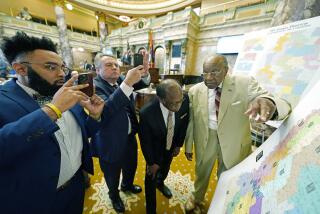Panel Urges Realignment of Appeals Court
WASHINGTON — The huge U.S. 9th Circuit Court of Appeals should be split into three divisions but not dismantled, a congressional study panel recommended Wednesday.
Under this novel proposal, Southern California and Arizona would emerge as a new federal appellate district based in Pasadena, with six to 10 judges. Northern California, Nevada and Hawaii would form a second division with a similar number of judges, while the Northwest states from Montana to Alaska would form a third division based in Seattle.
But the San Francisco-based 9th Circuit--which has 22 active judges--would remain a single administrative unit with the power to resolve disputed points of law when the divisions disagreed. The total number of judges would remain the same.
This plan, put together by a five-member commission headed by retired Supreme Court Justice Byron White, is designed to resolve two problems: one administrative and one political.
Many say that the 9th Circuit court, spanning the nine states of the far west and covering more than 51 million people, is simply too big. The active judges rarely see one another and cannot form a collegial group, according to this view.
Others, particularly Republican senators from the Northwest, complain that the 9th Circuit is too liberal. They argue that liberal judges from California dominate the court and make their will felt on matters ranging from the environment and immigration to crime and the death penalty.
It is not clear if the proposed separate judicial divisions announced Wednesday will go far enough to satisfy the critics, although it would create a “semiautonomous” group of judges for the generally more conservative Northwest.
Sen. Conrad Burns (R-Mont.) said he was disappointed that the report stopped short of recommending a complete division and noted that Congress will view it as “a floor, not a ceiling.” The report “is somewhat dismissive of the arguments and evidence in favor of splitting up the 9th Circuit, but then recommends a de facto division” that would preserve the existing 9th Circuit, he said.
Sen. Dianne Feinstein (D-Calif.), who opposed earlier suggestions to split California into two circuits, said she had not had time to read the proposal or to reflect on it.
The 9th Circuit’s Chief Judge Proctor Hug Jr. was hearing cases in San Francisco on Wednesday morning when he learned of the proposal.
“They have kept this pretty close to the vest. My initial reaction is I’m pleased the commission said the circuit should not be split,” Hug said.
He and most of his 9th Circuit colleagues opposed the breakup of the appeals court, as did many California lawyers. The judge said he also was pleased that the commission found that the 9th Circuit handled its cases as efficiently as others.
Hug delighted in the report’s language that “administration of the 9th Circuit is at least on a par with other circuits and innovative in many respects,” since it undercut a core argument by critics. But he said he was not ready to endorse the proposed separate judicial divisions.
In part, the move to split up the 9th Circuit is also being driven by the Supreme Court. The conservative justices on the high court have repeatedly criticized the array of liberal rulings from the 9th Circuit. In recent terms, they have voted to review and reversed an unusually high percentage of 9th Circuit rulings.
Four members of the high court--Justices Sandra Day O’Connor, Anthony Kennedy, Antonin Scalia and John Paul Stevens--recommended a division of the 9th Circuit in a letter to the commission.
The commission plans to take comments on its proposal over the next month and submit a final report to Congress by the end of the year. The proposed realignment of the appeals court requires new legislation from Congress. On the Internet, the report can be found at https://app.comm.uscourts.gov
In a related matter, Berkeley law professor William Fletcher’s three-year wait to win confirmation to the 9th Circuit may end Thursday.
In April 1995, President Clinton nominated him to fill a vacancy on the appeals court. But Senate conservatives have blocked a final vote. Senate sources say that his nomination had been scheduled to come up for a vote Wednesday but was put over to Thursday.
More to Read
Get the L.A. Times Politics newsletter
Deeply reported insights into legislation, politics and policy from Sacramento, Washington and beyond. In your inbox three times per week.
You may occasionally receive promotional content from the Los Angeles Times.











